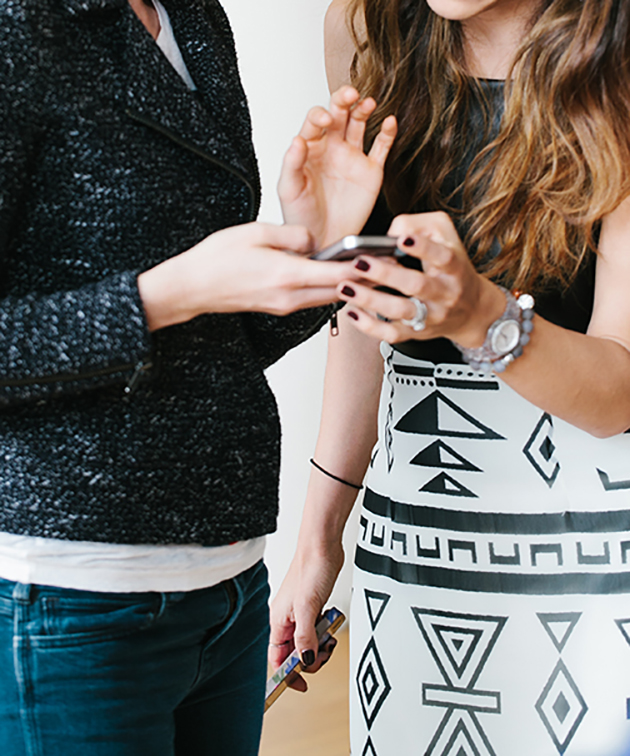
(Photo from when I taught classes on social media – ironically.)
Today Gabe and I wanted to open up the conversation about social media. Gabe was an educator and school administrator for middle school and high school aged students for almost ten years, and has seen first hand the shift from pre-social media to a technology oriented generation. Social media is a large part of the work we do as bloggers, so it is something we are constantly evaluating. We do believe it can be used for good, but in the same vein we will probably only be giving our children flip phones in high school. 😉 We want this post to be merely food for thought and discussion within your own circle of friends and families. It is not meant to draw conclusions or judgements as we are very much still in the unknown of this newer age of technology. I am going to turn it over to Gabe to share his experience and research.
I started my work in education just after the founding of Facebook, and just before the release of the first iphone. (Back when you needed a university issued email address to join facebook… yep.) From the start of my career as a teacher through my most recent years, I witnessed a dramatic shift in the technology usage of my students.
I was in a unique position to witness first hand the growth of smartphone technology and social media amongst the youth, but also watch how this technological and social media growth impacted the generation from year to year. Some impacts have been amazing to see, such as access to new resources and information, new ways for students to develop creative expression, and the ability to make learning more interactive and hands on. However, I also saw increases in anxiety, depression, stress level, and social conflict, just to name a few.
One thing I think we need to keep in mind however, is why social media platforms are developed and grown. Simply speaking, social media is designed to target and exploit our human need for connection as a means to make money. The first president of Facebook, Sean Parker, stated in an interview with the website Axios “God only knows what it’s doing to our children’s brains… It’s a social-validation feedback loop… exactly the kind of thing that a hacker like myself would come up with, because you’re exploiting a vulnerability in human psychology. The inventors, creators – it’s me, it’s Mark [Zuckerberg], it’s Kevin Systrom on Instagram, it’s all of these people – understood this consciously. And we did it anyway.”
When we as humans feel a connection with another person or group, or when we receive a compliment from another, a form of dopamine is released in our brain which gives us a sense of satisfaction. Social media is designed to create that satisfaction repeatedly over brief periods of time, thereby conditioning us to crave the satisfactory feeling. This is the direct intention for including “likes”, “views”, emojis and public comments. It is a means to validate our self worth on some level in a repeatable way. This naturally drives us to use the platform more often, and turns the social media platform into not only a lucrative way to advertise directly to us the consumer, but also to project marketing trends by studying the information that the platforms collect when we use them. Both of these equate to more profits for the social media company.
Something worth giving thought to is that no one knows the long term effects of extended social media use on the human brain….especially a child’s brain. Multi-year studies are just now beginning to be published examining long term statistical trends in regards to smartphones and social media. Many of these support the need to reduce and regulate our consumption of social media as they point to some concerning trends. A 2017 study by the American Psychological Association seems to present a direct correlation between increased use of technology and social with increased levels of stress, especially in today’s youth. These articles (#1, #2, #3 ) by Dr. Jean Twenge suggests a correlation between an increase in sleepiness, loneliness, dependence, depression, and isolation among teenagers and the development of smartphones and social media. This 2015 survey suggests that the average American teen consumes about 9 hours of media per day day while a tween consumes 6 hours per day. That is an alarming amount of time. While a clinical review from the National Center for Biotechnology Information suggests that social media amplifies ones positivity or negativity based upon the type of interaction he or she chooses to consume as well as what the viewer is prone to feel. This Forbes article from 2017 examines 6 ways in which social media can negatively affect our mental health as adults if we are not vigilant of how often it is used and what is viewed (it includes links to its sources).

Now, one thing I want to make clear – I am neither anti-social media, nor am I anti- technology/smartphone. I have come across positive ways in which personal technology and social media has in the past, and is currently helping and uplifting others. I personally use both regularly, not only for my job (obviously!), but also for leisure. It has become a critical resource for learning, inspiration, and problem solving. It has also provided a great avenue for friendship that would not be possible otherwise (wink to my buddy William in Florida). I know that there are positives that cannot and should not be overlooked, but as a father, former educator, and entrepreneur who depends on and works within social media, I believe it is our responsibility as adults to continually evaluate on our own habits, our personal intentions for using social media, our consumption level, and if the nature of the social media we consume is positive and uplifting, or negative and divisive. What we view, post, and say on social networks directly impacts our mental, emotional, and spiritual health. Subsequently, it also makes an impact on everyone around us, especially our families. Are we taking that responsibility seriously?
Anna and I have frequent discussions on how we hope to use it for good, as well as constant re-evaluation of habits. It isn’t easy to be immersed in it for work and not feel drained by it at times. Anna has set times within the day to check in, post, and interact, and we both leave our phones aside when we are spending time with each other or with our children. We know they are little sponges observing our behavior, and will learn an order of priorities based on how we live our life. We definitely let them watch a fare share of Blue’s Clues or Wild Kratts, but we are totally okay with them not being familiar with how to use a smartphone. Setting these boundaries is difficult at times, but I see them as a proactive way of fighting for not only our mental and emotional health, but that of our children as well.
We wanted to share this with you as a means for conversation within your own homes, and with your friends. We are in an era where the age of technology and smart phone use is still relatively new, and my hope is that we start to understand the gravity and importance of understanding how it can affect our lives and our culture, both positively and negatively. Drop your thoughts below. We will be here to discuss!






















